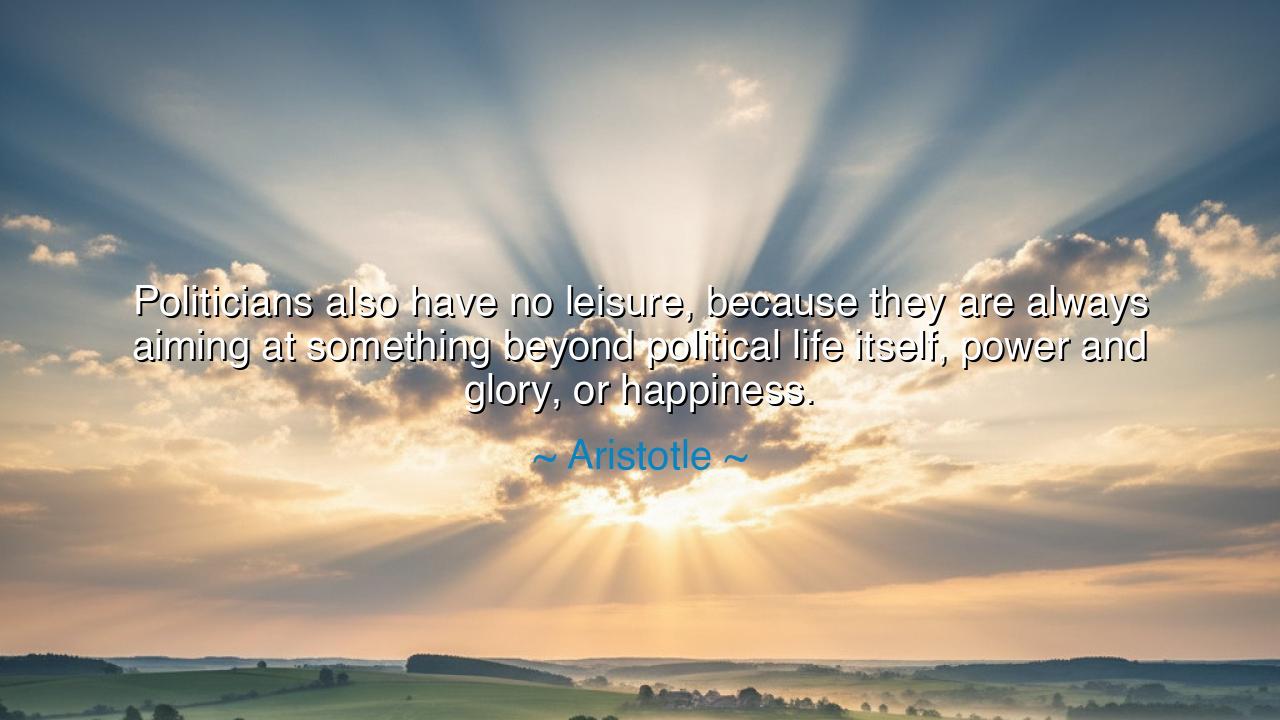
Politicians also have no leisure, because they are always aiming
Politicians also have no leisure, because they are always aiming at something beyond political life itself, power and glory, or happiness.






The philosopher Aristotle, whose wisdom still lights the path of reason, once wrote: “Politicians also have no leisure, because they are always aiming at something beyond political life itself—power, glory, or happiness.” In these few words lies a timeless truth about the restless nature of human ambition. To the unwise, this may sound like a criticism of rulers and statesmen, but to the thoughtful heart, it is a mirror held before all of us. For it is not only those who govern nations who lose their leisure—it is all who forget that life’s highest purpose is not to chase after ends beyond themselves, but to dwell in the fullness of the present moment, to be at peace with the soul’s own being.
In the Greek world, leisure—or scholē—was not mere idleness. It was sacred stillness, the fertile soil of wisdom, the space where the mind could commune with truth. To Aristotle, true happiness (eudaimonia) did not arise from constant striving, but from living virtuously, in harmony with reason, and from contemplation of the good itself. Yet those who live in the realm of politics, he observed, are forever driven outward, seeking power, influence, and honor. Their minds are tethered to the approval of others, their spirits entangled in the web of worldly affairs. Thus, they know no peace, no rest, no true leisure. Their eyes are fixed upon distant prizes that fade even as they are grasped.
And yet, this insight extends far beyond the world of politics. Every man and woman who seeks meaning through endless striving, who measures worth only by what is achieved, becomes enslaved to a life without leisure. The merchant who labors endlessly for gold, the artist who creates only for applause, the worker who dreams only of promotion—all share in the same restlessness. Like the politician chasing glory, they too lose touch with the quiet center of the soul, where joy and wisdom dwell. Thus, Aristotle’s observation becomes a warning to all ages: that the pursuit of greatness without inner peace is the slow death of the spirit.
History gives us many examples of this truth. Consider the fate of Napoleon Bonaparte, the man who rose from obscurity to command the thrones of Europe. He was the very image of power and glory, yet never knew leisure. Even in triumph, his mind was filled with the hunger for more—more lands, more victories, more immortality. The world bowed before him, yet his soul remained unsatisfied, for he had mistaken conquest for meaning. In the end, his empire crumbled, and he was left alone on a barren island, a prisoner of his own ambition. What he sought in the world, he could never find, because it was not in the world to give. The peace he lacked was within him all along.
Contrast this with the philosopher-king Marcus Aurelius, who, though burdened with empire, found his leisure in the quiet discipline of his own thoughts. Amid wars and plague, he turned inward and wrote words of calm reflection that still comfort the weary centuries later. “Nowhere can man find a quieter or more untroubled retreat,” he wrote, “than in his own soul.” Marcus knew that true happiness is not born from external conquest but from mastery of the self. Thus, he lived not for glory, but for harmony. He ruled not to dominate, but to serve. And in his leisure of the spirit, he found what kings and conquerors seldom do—peace.
The meaning of Aristotle’s words, then, is both caution and counsel. He teaches that the ceaseless pursuit of power, fame, or even happiness as an external prize blinds us to the deeper joy of simply being. Those who live always “aiming at something beyond” will never taste the sweetness of the present. Their days are consumed by motion, but their souls remain stillborn. True leisure, in contrast, is not a pause in work—it is the highest work of the spirit, the art of being fully awake to the beauty of existence.
Let this be a lesson for all who strive: seek leisure, not laziness; seek contemplation, not escape. Take time each day to lay aside the weapons of ambition and rest in silence. Walk without a goal, listen without reply, think without the pressure to conclude. For in such moments, life itself reveals its hidden radiance. The heart grows clear, the mind grows still, and the spirit begins to remember its own divine rhythm.
And so, my child, remember: power fades, glory wanes, and even the pursuit of happiness can become a chain if it blinds you to the sacred peace within. But the soul that learns leisure—that finds rest not in idleness but in wisdom—becomes unshakable. Such a one walks through life as through a quiet garden, content not because he owns the world, but because he has mastered himself.






AAdministratorAdministrator
Welcome, honored guests. Please leave a comment, we will respond soon